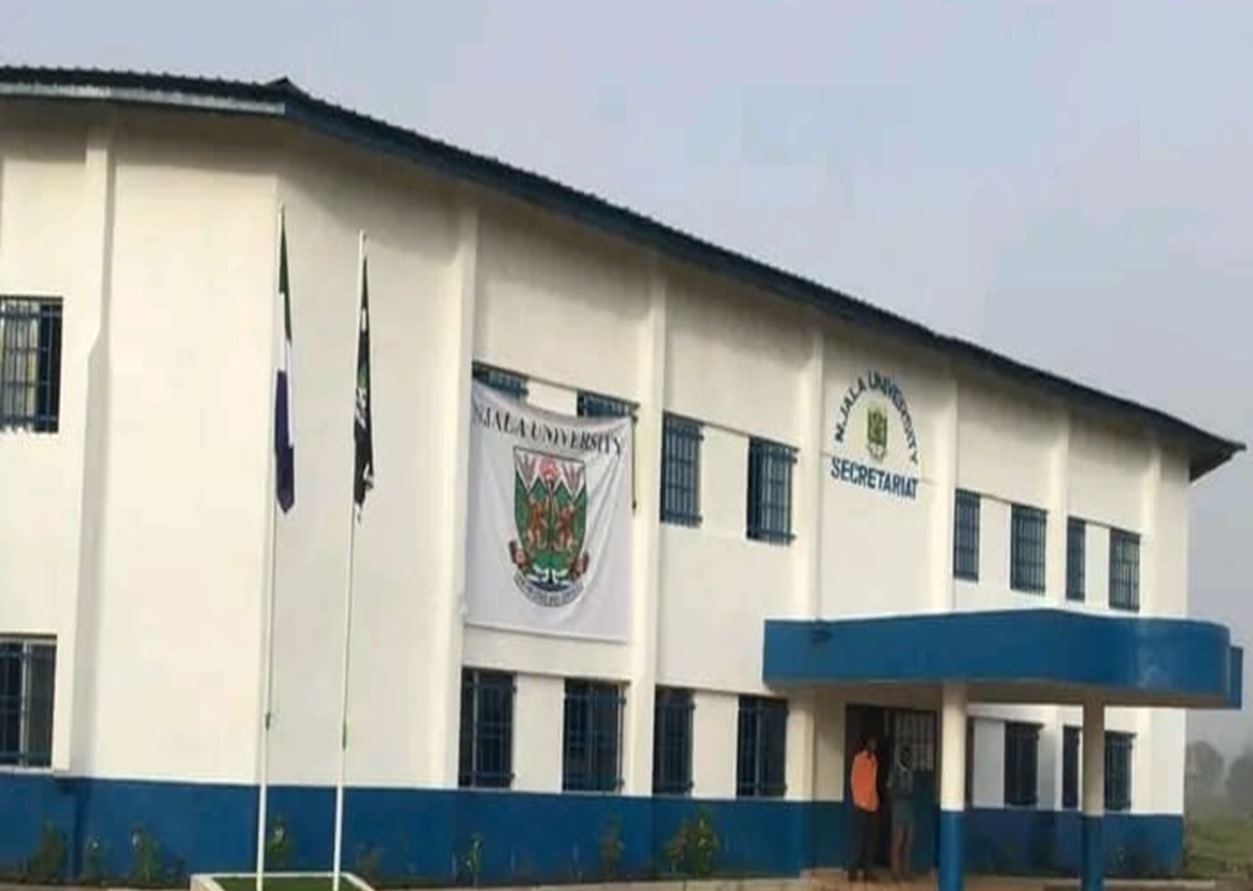By Newman Anthony Levey
It is not an overstatement that every family wants their children to be enrolled at Njala University. A good number of students who passed the West Africa Senior Secondary School Certificate Examination (WASSCE), across the country gained admission to Njala University.
The University has expanded beyond the imagination of those who established it in 1964 from Njala Mokonde in the Moyamba district and Bo and Freetown. Three years ago, the University introduced Distance Learning with campuses in Bo, Pujehun, Moyamba, Rutile, Bonthe and Kono with the aim of taking higher learning to the doorsteps of those who need it in their localities.
Njala University now has more students than any other University in Sierra Leone and the mad rush for spaces continues as the college brings in more courses with evolving teaching methods matching standards around the world.
The picture is not all bright as the University is facing numerous challenges including, but not limited to classroom space to accommodate the growing number of students enrolled year in year out. I should mention inadequate student hostels built 50 years ago, staff quarters and transportation.
Majority of the students have rented rooms in communities close to their campus. Some are in deplorable condition and the owners are taking advantage of the situation to charge crazy amounts of money. Talk to the students about sanitation and the like and they will tell you: “we have no option, we go bear ya”.
There is a need for the Administration to focus on building Hostels and classrooms instead of rushing into something like a medical school which the present administration is pushing hard to achieve.
The government of Sierra Leone and private business institutions can also support Njala University with hostels, classrooms and transportations. The classrooms are constantly jam-packed.
Another challenge students were faced with is leaving lectures to queue at Sierra Leone Commercial Bank to pay their fees. In February last year, I wrote a story about the challenges students confront to pay their fees at the bank. That situation was quickly put under control. There is a teller from SLCB now in both (Towama and Kowama) locations in Bo.
A lot is going on to improve life on campus for the students but why is this challenge of so-called missing grades so persistent? Five years ago, the University introduced the law program. The first graduates are lawyers today. That’s commendable.
I have been reliably informed that students who are in their final year who do not have their fees would not be allowed to write the Comprehensive Examination and they would have to wait for another year. Sad!
I cannot end this with noting the selfie and Tik Tok generation now at Njala University (NU). Some students hang around taking photos and doing Tik Tok for a good part of the day either missing or being unnecessarily late for class. Don’t be surprised when NU starts asking them to return home until they are ready to learn how to strike that delicate balance between work and play.
The Millennium Challenge Corporation (MCC) Board held its quarterly meeting on December 13 and selected Cabo Verde as newly eligible to develop a compact for the purpose of regional economic integration. The Board also selected Tanzania and the Philippines to develop threshold programs, which are smaller grant programs designed to support policy and institutional reforms that address economic growth constraints.
“The Board’s selection of Cabo Verde, the Philippines, and Tanzania advances MCC’s mission to forge strong partnerships with countries that have demonstrated a commitment to democratic governance, investing in their people, and economic freedom,” said MCC’s Chief Executive Officer Alice Albright. We look forward to building on prior partnerships and working hand in hand with each country to advance prosperity for their people.”
MCC’s Board selected former compact partner Cabo Verde as eligible to develop a regional compact in recognition of the country’s clear commitment to democratic governance and its significant development and poverty reduction challenges. With this new partnership, MCC will support Cabo Verde in generating economic growth through deeper integration with the West Africa region.
Newly threshold-eligible, the Philippines and Tanzania are both former MCC compact partners that continue to face pressing development needs in strategic regions of the world. In recent years, both the Philippines and Tanzania have demonstrated renewed commitments to advancing critical reforms to strengthen democratic governance, protect human rights, and fight corruption. In recognition of these efforts, MCC’s Board selected the Philippines and Tanzania to partner with MCC in the development of threshold programs that focus on the policy and institutional reforms countries can undertake to reduce poverty and generate economic growth.
As part of its annual discussion on country selection, MCC’s Board also reviewed the policy performance of previously selected eligible countries. In doing so, MCC’s Board reselected Côte d’Ivoire and Senegal to continue regional compact development; The Gambia, Togo, and Zambia to continue compact development; and Mauritania to continue developing a threshold program. The Board reaffirmed its support for continuing compact development in Belize. In addition, the Board reselected Sierra Leone as eligible to continue developing a compact in recognition of the progress made to advance the national dialogue process, begin implementation of the Agreement for National Unity, and establish the national election review committee. These actions constitute a critical beginning of an inclusive process to strengthen Sierra Leone’s democratic and electoral institutions following the June 2023 elections. In making its re-selection decision, the Board noted its expectation of continued progress toward meaningful electoral reform, as outlined in the Agreement for National Unity, prior to considering approval of the proposed compact.
MCC’s Board of Directors received an update on political developments in Niger and MCC’s progress in winding down the country’s bilateral compact, as well as updates on the status of the Connectivity and Coastal Resilience Compact in Mozambique following concerns over the flawed October 2023 municipal elections.
The Millennium Challenge Corporation is an independent U.S. government agency working to reduce global poverty through economic growth. Created in 2004, MCC provides time-limited grants and assistance to countries that meet rigorous standards for good governance, fighting corruption and respecting democratic rights.












